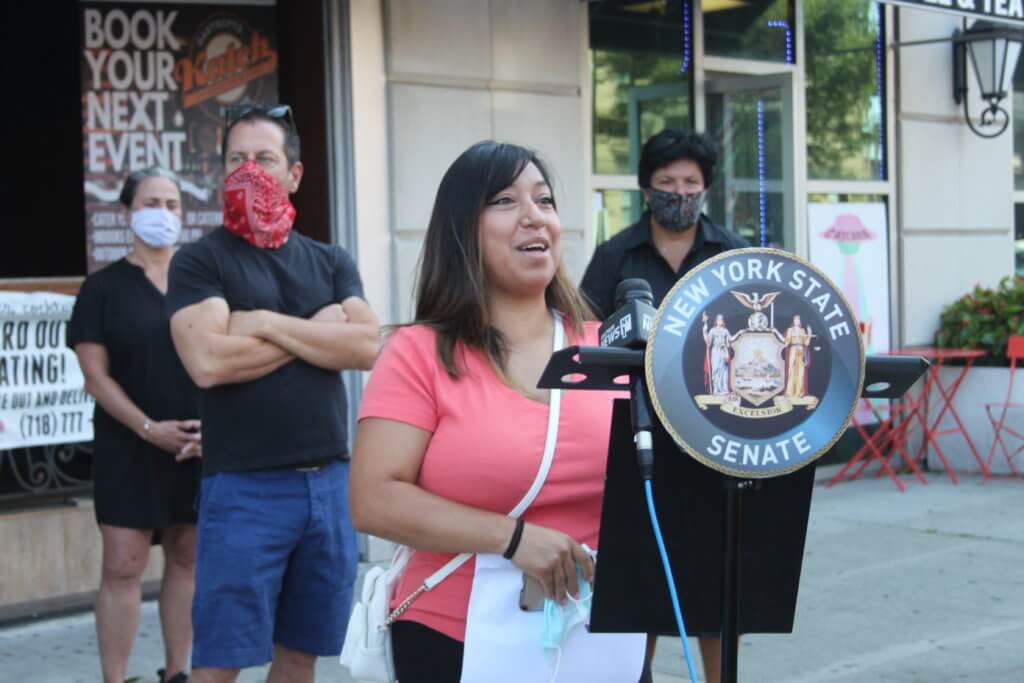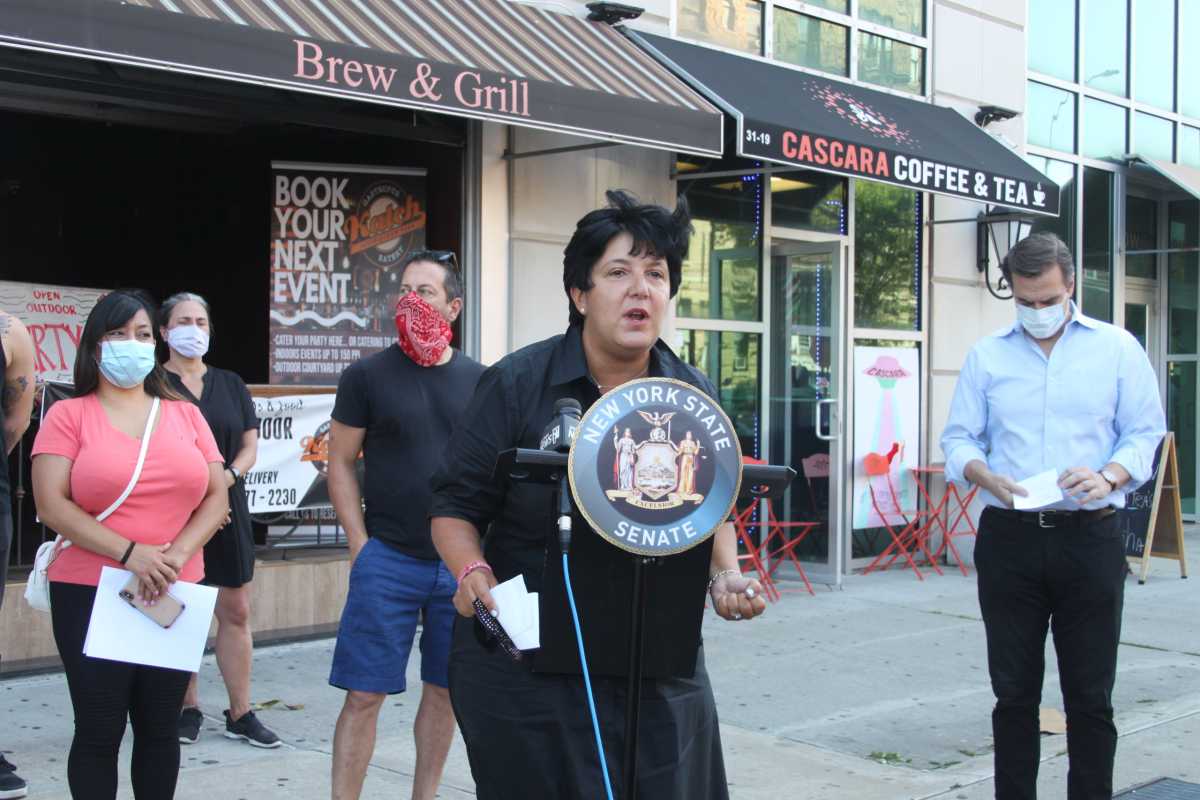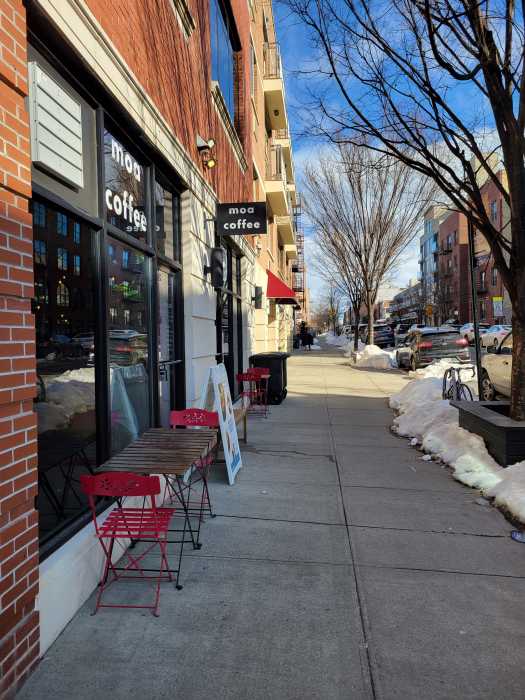State Senator Michael Gianaris stood with some small business owners of Astoria and Long Island City to call for rent forgiveness on Wednesday, Aug. 5.
In front of Katch Astoria, located at 31-19 Newtown Ave., Gianaris spoke about his legislation that would forgive three months of rent for small business owners, tenants and some homeowners. The Astoria representative introduced the bill (S8125A) back in March.
“Not nearly enough has been done to help our small businesses survive the pandemic, and now we’re starting to feel more dramatically the consequences of that inaction,” he said. “As many as a third of small businesses may never reopen because of what’s happening, because of the fact that they haven’t gotten enough assistance from their government.”

According to a report by the New York Hospitality Alliance, 83 percent of New York restaurants, bars and nightclubs did not pay their full July rent, with nearly 40 percent unable to pay anything at all.
Gianaris said he crafted the bill with the help of his small business advisory council months ago to offer rent relief.
The proposal would allow residential and commercial tenants to have 90 days of rent forgiven if they lost their work or closed due to the COVID-19 pandemic. When it was first written, it was intended to be 90 days from the beginning of the emergency, but Gianaris said that will be amended to clarify exactly what time it would need to be in effect if it passes in the Legislature.
“If we forced their businesses to shut down, why are we still insisting that they pay rent for a business that’s not operating?” he said. “Let’s give them at least that help. By the way, that alone is not enough, but at least that would be something to allow them to keep functioning now as we start to slowly reopen.”
Roseanne McSorley, co-owner of the relatively new gastropub Katch Astoria, said businesses won’t be able to run the way they did before.
“Every corner here has a closed business, we are the last man standing on this street,” said McSorley, who also heads Gianaris’ small business council. “Our landlords are trying to work with us but they have bills as well. We have three and four months of rents piling up, our Con Edison bills, our supply bills. We just can’t survive; we need targeted relief.”
McSorley also spoke during last week’s small business presser at Queens Borough Hall, organized by Queens Together and the Queens Chamber of Commerce, where small business owners called on elected officials to offer real economic relief.
Shawn Dixon, owner of Otis and Finn barbershop with locations in Long Island City and Greenpoint, said small businesses operate “as much like a family as they do businesses.”
Dixon and McSorley recently wrote an op-ed for the New York Daily News calling for bold relief from city and state lawmakers.
Shawn Dixon, owner of Otis and Finn barbershop in LIC/Greenpoint, said they closed for 3 months bc they believed “we’re all in this together.”
“But now here we are, having put thousands of dollars into our business to reopen & like many of our neighbors, 3 months behind on rent” pic.twitter.com/rdUF86XhFf
— Angélica M. Acevedo (@angacevedo15) August 5, 2020
“When the governor and the mayor called on us to close our business indefinitely this year as part of the PAUSE program, we did that in the name of public health,” Dixon said. “We went over three months, 95 days, with almost no revenue at all. But we did that because we believed our leaders when they said, ‘We’re in this together.’ But now here we are five months later, having put thousands of dollars back into our business to reopen, and like many of our neighbors, three months behind on rent and small business have been left alone holding the bag.”
Dixon and McSorley later mentioned Queens Together’s new petition to garner support for actions like creating an immediate path to commercial rent relief, fund a new round of NYC Department of Small Business Services’ disaster grants and loans with improved guidelines and make permanent the caps on third-party app delivery fees for restaurants.
At the presser, Gianaris mentioned that nonprofits are also at risk of disappearing. He introduced Sheila Lewandowski, the executive director of the Chocolate Factory Theater in Long Island City. She spoke about theaters being one of the first to shut down as a result of COVID-19.
“We had a show that was in production. The artist had been in residence for three weeks. The set sat there empty … for three and a half months. We had six other shows that were scheduled between that time and the end of June — they all had to be canceled,” she said. “We paid all the artists even though we had no box office, even though our grants have been cut, even though we’re expecting more grants to be cut from the city and state to be cut because of the financial situation — yet our rent continues. Our electric has gone up, our major medical has gone up, our regular insurance bills have gone up.”
Jennifer Gualotuna, who runs Astoria Express Transit, her family’s private bus service company that has operated in Astoria for more than 30 years, described a similar dire situation.

“We’re going into six or seven months already [of not operating],” she said. “Our landlord is already bothering and insisting we give him the money that we owe, and it’s over 5,000 dollars that we don’t have. We have not made one cent, as much as we’ve tried to ask for help, nothing has come through.”
Gualotuna said the unemployment and the Pandemic Unemployment Assistance they’ve received has all gone toward their business.
“Then there’s no more school bus for the community, what we’ve been offering for 30 years,” she said. “Then I got to start over saying, ‘I’m 37 and I gotta look for a new job.’ My parents are 62 and 65, ready for retirement soon and now they gotta look for a new job. Imagine making a resume for somebody that age? Who is going to hire them, where are they going to go?”
She told QNS that if school doesn’t start up in September and they don’t receive some relief, the business may not make it. Their savings are almost entirely gone.
“It’s very hard to make a decision when you don’t even know what’s going to happen in the future,” she said. “You want to be prepared but at the same time you don’t want to let go. It’s so hard to let go of the business, because you built it from scratch and you made it there for so many years and you don’t want to give up on a relationship you’ve built for 30 years.”




































